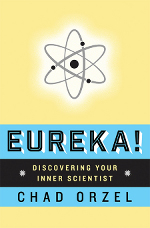While I’m running unrelated articles head-on into each other, two other things that caught my eye recently were Sabine Hossenfelder’s thoughts on scientific celebrities (taking off from Lawrence Krauss’s defense of same) and Megan Garber’s piece on “attention policing”, spinning off that silliness about a badly exposed photo of a dress that took the Internet… Continue reading Celebrities and Attention Police
Category: In the Media
Division of Labor in Science Communication
Paige Brown Jarreau, who blogs at From the Lab Bench is in the throes of writing her dissertation about science blogging, and plowing through a lot of interview data. She’s sharing some of the process on the blog, and a lot more on Twitter, where it’s prompted a good deal of discussion. One of the… Continue reading Division of Labor in Science Communication
Eureka at BookLab
There’s a new-ish book review podcast covering pop-science books, BookLab, hosted by Dan Falk and Amanda Gefter, and their latest episode includes my Eureka as the third of three books being discussed (a bit more than 40 minutes in, though their discussion of the other books is also interesting…). It’s sort of an odd experience… Continue reading Eureka at BookLab
Social Media Are Social
I didn’t see this before yesterday’s post about Twitter, but over at SciLogs, Kirk Englehardt gets evangelical, offering a very chipper list of “Ten Reasons for Academic Researchers to Use Social Media.” I’ll just put the item headers here, though each of these has a more complete description, with links to lots of other stuff:… Continue reading Social Media Are Social
Twitter Is Kind of Useless
The AAAS annual meeting was last week, which apparently included some sessions on social media use. This, of course, led to the usual flurry of twittering about the awesomeness of Twitter, and how people who don’t use Twitter are missing out. I was busy with other stuff, so I mostly let it pass, and of… Continue reading Twitter Is Kind of Useless
The Big Picture of Eureka
No, not the little cover .jpg that I use as the “featured image” to tag these posts promoting Eureka. The post title refers to the Big Picture Science radio show from the SETI insitute. I’m one of the people interviewed in the latest episode, Maria Konnikova (author of Mastermind) and Louis Liebenberg. This is another… Continue reading The Big Picture of Eureka
The Bright Side of the BICEP2 Story
I’ve done yet another piece for The Conversation, this one expanding on something I’ve been saying in interviews promoting Eureka: that knowing the process of science can help people sort good science from bad. In this particular case, I take the somewhat #slatepitch-y angle that the recent high-profile unraveling of the BICEP2 experiment’s claim to… Continue reading The Bright Side of the BICEP2 Story
Stuff That Doesn’t Belong on Student Evaluations
This was a good week for “Chad bristles at side issues of massively reshared stories,” with the Vox and gender bias stories, and also this PBS piece urging parents to tell their kids science stories. That probably seems surprising, given what I do around here, but while I fully endorse the end of that piece,… Continue reading Stuff That Doesn’t Belong on Student Evaluations
Pros and Cons of Super Bowl Science
The ending of last night’s Super Bowl couldn’t’ve been more perfect as a demonstration of the point I was making about scientific thinking in football (and, you know, in that book I keep flogging…). First, on the positive side, you have New England’s Malcolm Butler making the key play: “I knew what was going to… Continue reading Pros and Cons of Super Bowl Science
Super Bowl Athletes Are Scientists At Work
I wrote up another piece about football for the Conversation, this time drawing on material from Eureka, explaining how great football players are using scientific thinking: Seattle Seahawks cornerback Richard Sherman gets called a lot of things. He calls himself the greatest cornerback in the NFL (and Seattle fans tend to agree). Sportswriters and some… Continue reading Super Bowl Athletes Are Scientists At Work
